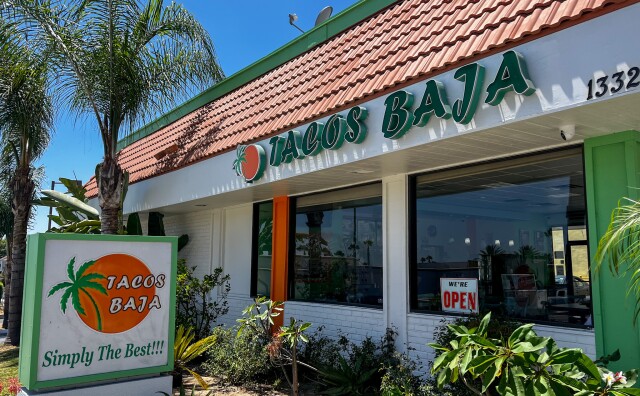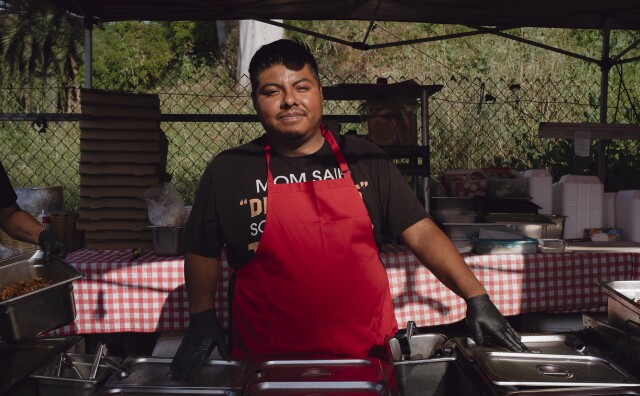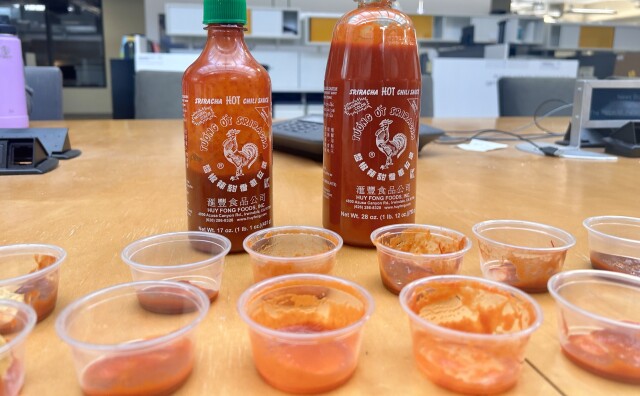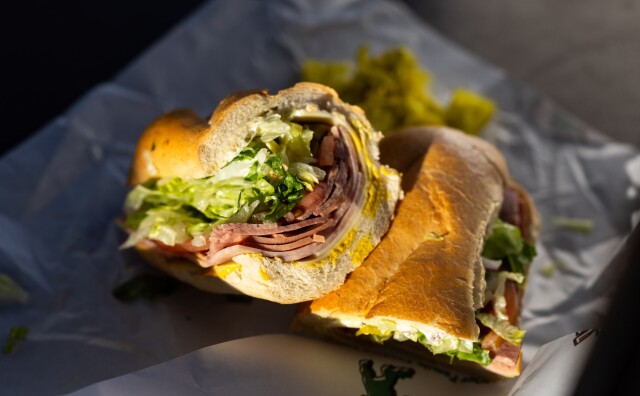Felix Agyei and his wife Hazel Rojas both work at their regular jobs Monday to Friday — Agyei as a data analyst and Rojas in educational services. But on Saturdays, they head to a shared commercial kitchen space to prepare the food for Masarap Cafe, their West African-Filipino food pop-up that comes to Riviera Village Farmers Market in Redondo Beach every Sunday.
Walking by their booth on a recent Sunday morning, Agyei calls out and asks if I want to try goat stew. “If you don’t like it, I’ll give you a dollar,” he offers.
The combination of West African and Filipino cooking is certainly uncommon, and Agyei knows he needs to entice passersby to try it (as well as convince them that his food is not going to be too spicy.)
His tactic seems to work — he says virtually everyone who samples the food ends up enjoying it, and many become repeat customers (including me).
-
What candidates can — and can't — say they do
-
Nonprofit's launching fundraiser to keep it afloat
-
USC study documents what residents want from trees
Blending Of Backgrounds
Felix came to the U.S. from Ghana, and met his wife, Hazel, who is Filipina, when they both were working at New Design Charter School in Watts. The two started dating six years ago and got married in 2020.
The blending of West African and Filipino food in a single meal became common in their household.
“This is something we were doing at home,” Agyei said.
Rojas would regularly prepare pancit, a traditional Filipino noodle dish, while Agyei prepared jollof rice, a staple West African dish made with rice, tomatoes and onions. When they had friends over, everyone seemed to enjoy the combination, and the idea of starting a restaurant was slowly planted in their minds.
Masarap Means Delicious
“The whole idea of the cafe came when we came downtown to eat at a Filipino restaurant,” Agyei recalled. He asked Rojas what the Filipino term for ‘delicious’ was — and that’s how the name for Masarap Cafe was born.

They initially started at the farmers' market in January 2020, but were shut down a couple of months later as the pandemic hit and all markets had to temporarily close. They finally restarted again in the summer of 2021.
At Masarap Cafe, tortang talong — a Filipino egg omelet where whole grilled eggplant is dipped in an egg batter and pan-fried — is served with jollof rice.
Their Secret Ghanaian Filipino Sauce
Even the seemingly traditional West African dishes featured on the menu still manage to contain elements of Filipino cuisine. Agyei and Rojas have come up with their own sauce that they’re calling Masarap sauce, marrying Ghanaian spices with spices traditionally used in Filipino cuisine. The exact spices used are a closely guarded secret, but they are blended with olive oil, garlic, onion, tomato and ginger.
The Masarap sauce is found in the majority of their menu, including goat stew, baked chicken, and baked salmon dishes, all served with jollof rice and a salad tossed with grapes and thinly sliced apples that serves as a palate cleanser.

Lately, Masarap Cafe has become popular enough that they always sell out of certain items every Sunday. The goat stew is one of their most sought-after items. Pressure-cooked with the masarap sauce until it is tender, the goat meat is then cooked again in a savory tomato-based stew. Masarap Cafe opens at 9 a.m. on Sundays, and the goat stew might sell out around noon, followed closely by the baked salmon.
Agyei and Rojas have slowly added a couple of new items to the menu, including the masarap wrap — a wrap filled with jollof rice, corn, green and lima beans, carrots and baked chicken in their special masarap sauce — as well as a vegan version without the chicken. At about $6, the wrap makes for an easy and affordable meal for people to enjoy while shopping for produce at the market.
Permanent Location
Rojas wants to add more menu items from her Filipino heritage, including pancit, but the couple don’t have the resources to do so yet.

“At this moment it’s kind of hard to get employees to help us. It’s just the two of us and [we are] still doing normal work Monday to Friday,” said Agyei. “We go to the kitchen on Saturday to prepare the food, and then sell it on Sunday. It’s kind of challenging to add more menu items, but customers have been asking about more Filipino food.”
With all the positive feedback they have been receiving, Agyei and Rojas plan to find a permanent location so Agyei can transition to run the restaurant full time, as well as get their masarap sauce on the shelves of grocery stores.
They’re currently looking for a location in the Los Angeles area, but with prices going through the roof, they’re still on the hunt for the right space. In the meantime, you can find them at Riviera Village Farmers Market on Sundays.










